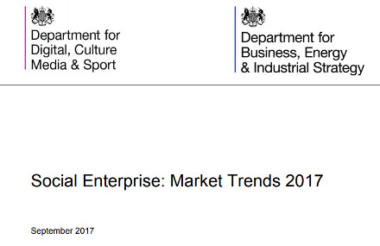The number of social enterprises in the UK small business population is likely to number approximately 471,000, with social enterprises more vulnerable to changes in the public sector, a government report has found.
The Social Enterprise: Market Trends 2017 report was commissioned jointly by the Department for Digital, Culture, Media and Sport and the Department for Business, Energy and Industrial Strategy.
It found that due to social enterprises are more likely than small and medium-sized enterprises (SMEs) to have the public sector as a customer which means that social enterprises “appear more vulnerable to changes in the public sector”.
It also found that nearly 9 per cent of the UK small business population are social enterprises.
The report revealed that roughly 1.44 million people are employed by social enterprises. Of the approximately 471,000 UK social enterprises, 99,000 social enterprises had employees and 371,000 with no employees.
It said that social enterprise employers tend to be more sustainable and more dynamic businesses in certain respects. For instance, nearly all social enterprise employers generated a surplus/profits in the last year, compared to three quarters of small and medium-sized enterprises (SME) employers.
Social enterprise employers were also more likely than SME employers to try and access information on day-to-day operations or strategic advice to help grow the business. The report found that 35 per cent social enterprises did this compared to 21 per cent SME employers.
'Higher levels of innovation'
Social enterprise employers also reported higher levels of innovation, were more optimistic with regard to longer-term growth prospects (over three years), and more open to advice and external information, compared to SMEs.
However social enterprise employers were also less internationally focussed as indicated by the lower rates of exporting compared to SME employers.
The survey was based on sampling for the BEIS’s Small Business Survey (SBS) and included 1,300 business owners and managers and respondents.
The report outlined the difficulties in defining social enterprises, with the Department for Business, Energy and Industrial Strategy and Cabinet Office using different definitions. A 2014 survey of SBS respondents were resurveyed with suspicions over the unreliability of SBS survey questions being used to identity social enterprises confirmed.
It states: “Consequently, this research set out to make revisions to the methodology. It did so following best practice to develop and revise survey questions in social science research.”
‘Vulnerable to public sector changes’
The report also said that because social enterprise employers are more likely than SME employers to have the public sector as a customer, they also appear to be more vulnerable to changes in the public sector. It showed that 60 per cent of social enterprises employers had the public sector as a employer in the past year, compared to 43 per cent of SME employers.
Nick Temple, deputy chief executive of Social Enterprise UK, which formed part of the advisory group on this work with government, said: “Social Enterprise UK welcomes this most recent report from central government on social enterprise. We are particularly pleased that the definition used for the research is now in line with that widely accepted by the social enterprise movement itself, which gives it more credibility.
“Whilst the sample is relatively small, the findings echo some of those of our own State of Social Enterprise survey; notably, that social enterprises are more likely to innovate with new products and services, more likely to be delivering public services, and more likely to seek external finance than their SME equivalents.”
Related articles












